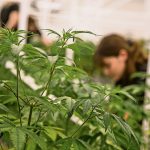COLUMBUS, Ohio (WCMH) — A judge temporarily blocked Gov. Mike DeWine’s executive order banning intoxicating hemp products, but efforts to stop the sale of “diet weed” products persist.
DeWine, citing harm to children, ordered businesses to remove intoxicating hemp products by last Tuesday. Also on Tuesday, stores were given a slight reprieve when a Franklin County judge intervened, halting the order as lawsuits play out in court. The restraining order lasts just 14 days, leaving lingering questions as to what the order means for Ohioans.
Intoxicating hemp products are cannabinoid products that are not controlled by the FDA, such as Delta-8 or Delta-9. Also called “diet weed,” these products are considered less intoxicating than other cannabis-derived products.
DeWine’s concerns stem from minors’ access to the products, as intoxicating hemp does not have to be sold at licensed dispensaries with rigorous ID checks. See previous coverage of DeWine’s executive order in the video player above.
Ohioans have been allowed to grow up to six cannabis plants at home since voters approved recreational marijuana in 2023. Under DeWine’s executive order, “intoxicating hemp” does not meet the definition of a “hemp product.” DeWine said the order did not alter cannabis law in Ohio, and residents can still grow small amounts of hemp at home.
Hemp and marijuana are both variations of the cannabis plant. Federally, hemp is classified as cannabis plants with less than 0.3% THC, whereas marijuana has more than 0.3%. Hemp is federally legal and has higher levels of CBD. THC and CBD are the two primary cannabinoids found in the cannabis plant, but only THC is considered intoxicating.
DeWine’s order blocked retailers from selling intoxicating hemp products, and applied to anyone selling, manufacturing or offering intoxicating hemp products for sale. The order reclassifies intoxicating hemp as any food or drink with more than 0.5 milligrams per serving of THC and limits sales to licensed dispensaries.
Home-grown hemp plants can be used, but they will not cause intoxication. Intoxicating hemp is made by chemically extracting metabolites and psychoactive substances from cannabis plants, typically only feasible in a professional facility.
DeWine’s order would ban “diet weed” manufacturing. It has little effect on Ohioans’ rights at home, as they were largely unable to manufacture intoxicating hemp to begin with. Professional hemp cultivators will see a change by the end of 2025, regardless of whether DeWine’s order is upheld.
In July, the Ohio Department of Agriculture said it would withdraw Ohio’s approved state plan for hemp manufacturing. Starting Jan. 1, people interested in growing hemp will need to receive a new production license through the federal Domestic Hemp Production Program. Any existing Ohio licenses will be voided on Dec. 31.










